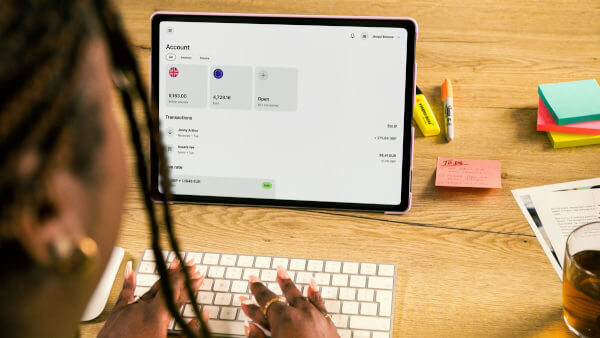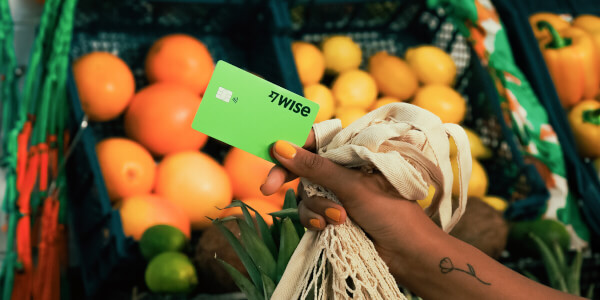Wise ACH vs wire guide
Everything you need to know about using Wise for USD transfers and paying via ACH vs wire

Costco members can apply for a Costco Anywhere Visa Card by Citi, for either personal or business use. This card can be used anywhere you see the Visa logo at home or abroad, and offers the chance to earn cashback on purchases. However, as with any credit card, you’ll want to know a bit about the fee structure before you decide if it is the right card for you.
Here’s a rundown of all you need to know about the Costco Visa credit card, and a brief overview of an alternative for international spending — the Transferwise borderless account — as a comparison.
If you’re thinking of getting a Costco card, the first thing you’ll need to do is decide which card is right for you. There are 2 different Costco Visa credit cards to choose from,¹ depending on your needs:
You’ll need to be over 18 and reside in the US with an active Costco membership to get a personal Costco Visa. To get a business Costco Visa, you need to be an authorized officer of a company, either owning at least 25% of it, or being in control of the business.
The good news is that there is no upfront foreign transaction fee charged for either the Costco personal or business Visa card. However, you do need to watch out for other costs, such as cash advance fees for foreign ATM withdrawals, and any foreign exchange spread which may be added to the exchange rate used. You’ll also want to steer clear of third party charges which may be added when using your card abroad, like dynamic currency conversion costs — more on all this in a moment.
If you’re considering getting a Costco Visa card for either your personal or business use, you’ll want to know a bit more about the full range of fees and options available.
It’s also good to know that the fees and annual percentage rates (APR) charged for using your Costco card can vary. The APR is based on the prime rate, and may change over time If you are given an introductory APR when opening your Costco Visa card, this will be applied for a fixed period before reverting to the standard APR as published by Citi.
Here’s an overview of the fees you need to consider:
| Fee type | Rate or charge² ³ |
|---|---|
| Annual fee | No fee as long as you have a paid Costco membership |
| Annual Percentage Rate (APR) for purchases | 17.49% for both card types |
| Annual Percentage Rate (APR) for balance transfers | 17.49% for Costco Anywhere Visa Card by Citi Balance transfers are not offered for the Costco Anywhere Visa Business Card by Citi |
| Annual Percentage Rate (APR) for cash advances | 27.49% for Costco Anywhere Visa Card by Citi 24.24% for Costco Anywhere Visa Business Card by Citi |
| Penalty APR — may be charged for late or returned payments | Up to 29.99% for both card types |
| Balance transfer fee | Greater of $5 or 3% of the amount transferred for Costco Anywhere Visa Card by Citi Balance transfers are not offered for the Costco Anywhere Visa Business Card by Citi |
| Cash advance fee | Greater of $10 or 5% of the cash advance amount for both card types |
| Late or returned payment fee — in addition to the application of penalty APR | Up to $39 for Costco Anywhere Visa Card by Citi Up to $37 for Costco Anywhere Visa Business Card by Citi |
There’s no upfront foreign transaction fee with a Costco Visa card. However, you’ll need to know the exchange rate being used to convert foreign purchases back to dollars, to be able to see whether or not you’re getting a good deal. Each bank will set their own exchange rates. A poor rate can mean your foreign vacation or online shopping from overseas works out more expensive than you expect.
If you hold a Costco Visa card for either yourself or your business, the exchange rate used for foreign currency purchases will usually be set by the network — in this case, Visa. Exchange rates move up and down all the time, depending on the global currency market — so the Visa exchange rate will be adjusted regularly. You’ll be able to find the rate used for your purchase using the exchange rate tool on the Visa website. Simply enter the date the payment was processed — which may be a day or two later than the actual transaction — and the currency, to see the rate used.
But once you have the Visa exchange rate, how do you know if it’s a good deal or not? One common method is to compare it to the mid-market exchange rate. The mid-market rate is the one banks use when they trade currency between themselves — and the one you’ll find if you use a google search for your currency pairing. However, banks and card issuers don’t always pass this rate on to their customers.
Instead, it’s common to add a markup or margin to the rate, which is then kept by the provider as profit. This can make it tricky to see exactly what you’re paying for currency conversion, as the bank’s profit is rolled up in the exchange rate applied.
If this sounds complicated, it’s helpful to know that not all banks and currency exchange services add a margin to the exchange rate used. Wise, for example, offers a solution for customers looking for currency conversion at the mid-market rate — the borderless account. You can hold any of over 40 different currencies in your borderless account, and switch between them for a transparent fee, using the mid-market rate, whenever you need to. You can send and receive payments, and manage your money online or through an app. You can also get the Wise multi-currency debit card, which you can use to pay for goods and services all over the world.
One final word on using a credit, debit or pre-paid card for international purchases.
It’s common to be asked, either by a merchant while you’re traveling, or via messages on an ATM screen if you’re making an overseas cash withdrawal, if you want to pay in your home currency instead of the local currency. This is because of something called dynamic currency conversion — usually shortened to DCC. DCC can be offered by banks and ATM operators on any international card transaction, and is sold as a helpful service to travellers who have not yet figured out the local currency. Paying in dollars sounds much easier, as you know where you stand without having to do the math on the exchange.
However, there’s a catch. Paying in dollars is usually more expensive, because the exchange rate used will be set by the merchant’s bank or the ATM operator. That means you won’t benefit from the Visa exchange rate, and might find that there are extra costs and fees added to the transaction, too. To avoid this, always choose to pay in the local currency wherever you are — and use an online currency converter to figure out the cost of your purchases in dollars instead.
If you’re a Costco member already, getting a Citi Visa card might be a convenient option, and allow you to collect linked rewards on your spending at home and abroad. There is no upfront fee for foreign transactions, but, as with any card, it’s well worth understanding the exchange rate used on international purchases, to make sure you get a good deal. If you’re looking for an alternative, or want to compare the rates on offer, check out the borderless account from Wise as a modern alternative for people who travel, and want to manage their money over multiple currencies, send and spend money abroad.
Sources:
All sources last checked 22 March 2019
*Please see terms of use and product availability for your region or visit Wise fees and pricing for the most up to date pricing and fee information.
This publication is provided for general information purposes and does not constitute legal, tax or other professional advice from Wise Payments Limited or its subsidiaries and its affiliates, and it is not intended as a substitute for obtaining advice from a financial advisor or any other professional.
We make no representations, warranties or guarantees, whether expressed or implied, that the content in the publication is accurate, complete or up to date.

Everything you need to know about using Wise for USD transfers and paying via ACH vs wire

Learn all about how the Wise card compares to no FTF ones.

Can you use a Wise Account to convert money you earn?

See how the Wise card compares with Chase Sapphire in our complete guide

Discover in detail whether your account information is visible to the recipient when you make a payment through Wise.

Not sure if Instarem or Wise is the best option for you in the US? Check our guide and find out.